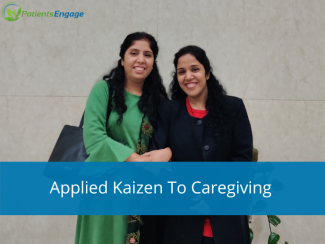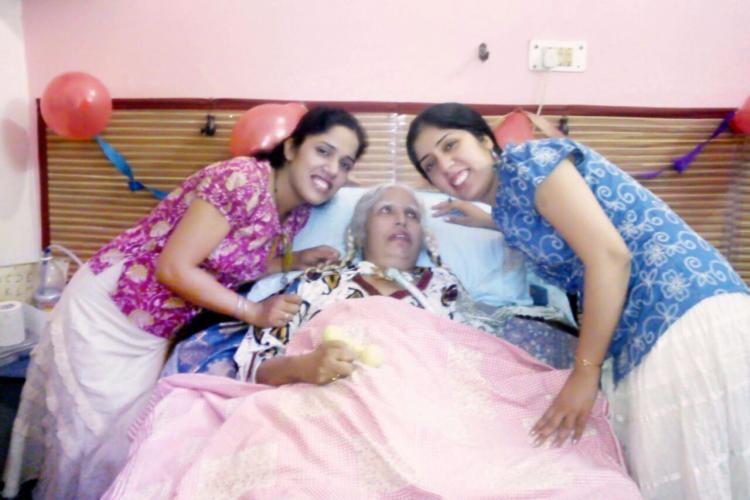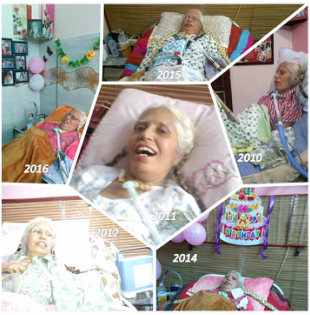
Satvinder Kaur and Sukhvinder Kaur are two sisters who took care of their mother who was diagnosed with ALS (Amyotrophic lateral sclerosis), a rare neurodegenerative disease for 11 years of which 8 long years were on a ventilator and ICU setup at home. Satvinder shares their years with ALS and all the trials and tribulations that accompanied it.
Please tell us how your mother was diagnosed with ALS and what were the early symptoms?
We (my brother, sister and I) were blessed with a very loving mother who was extremely caring, positive and lively person throughout her life and we were a very close knit family. Both our parents worked for the central government. While our father retired earlier, our mother took voluntary retirement from the Ministry of Culture in 2005 due to pain in her knees. In early 2008, the regular pain in her legs had progressed into overall weakness and a bit of change in her voice as well. After visiting multiple doctors, we were shocked to know that Mumma has been diagnosed with an unknown term called ‘ALS’ (Amyotrophic lateral sclerosis)- world’s worst, incurable progressive neuro-degenerative disease, with a lifespan of 2 years for 95% cases. Those who know the famous ‘ice bucket challenge’ or Stephen Hawkins may have heard of this condition. Nobody knew at that time that this mysterious term has the potential to turn our life upside down!
What made you take the tough decision to shift her home from the hospital?
Within 2 years of her diagnosis Mumma was almost paralysed, bedridden and put on a ventilator during an emergency situation.
This was also the time when we were exposed to the vagaries of hospitals and medical services.
In the doctor's opinion Mumma was just a body with nothing left in her to survive. This compelled me to study websites about the ‘ventilator’/’Home ICU’ setup. We were not medically advised to shift our mother to a home ventilator set up.
On 12th December, 2010, it was Mumma’s birthday, and we finally went ahead with this life-changing decision. After having a cake cutting celebration in the ICU room, we wanted to fulfill Mumma’s desperate wish to come back home, even if it was for one day.

How did you think you would manage the situation at home?
Before starting for home from the hospital , we tried to interview various nurses, but we were not satisfied. We realized we needed to be vigilant at all times. Sleepless days and nights continued for a long time after this, until we made sure that we could sustain this position for sometime.
As days, weeks started to pass by, we gradually started preparing a schedule for our ICU@home setup. There is a Japanese word called “kaizen” which means ‘continuous improvement’ and that explains our progress. Every day, every week, we both were critically examining, improvising and re-setting another refined level of doing the same procedures. Those medical professionals who seldom visited us, usually left with amazement by the quality and logic behind our state of procedures.
How did you balance your work life with caregiving?
Starting from the diagnosis in 2008, I started ‘working from home’ (WFH option was available in my IT company), which allowed me to balance work and life in these extreme situations of 11 years journey. Besides the never give up attitude of our mother who knew about this diagnosis from the beginning, my biggest support and strength has been my younger sister, Sukhvinder. She left her promising HR career in 2010 when Mumma reached the PEG (Percutaneous endoscopic gastrostomy) stage.
In late 2010 when we took the decision of setting up ICU at home, it took us some time to reach a disciplined routine due to continuously learning, improvising schedule and ICU procedures. When things started stabilizing, we thought of stabilizing ours. We hired a 24/7 house help to support household chores in mid 2011. Soon, Sukh found a job at a reputed school within 2 km of our house, so she could rush back anytime if needed.
Did you have to consult a doctor on a regular basis?
No. Very rarely.
Can you mention a few challenges of the diagnosis of ALS?
ALS is a progressive neuro degenerative illness that affects nerve cells in the brain and spinal cord. As the motor neurons begin to die, the ability of the brain to initiate and control muscle movement is lost. As the weakening paralysis continues to spread to the muscles of the body, ALS eventually affects speech, ability to swallow, chew and even breathe. And this slow loss of abilities and functions makes the patient and the caregiving family face unforeseen circumstances and challenges. Since ALS attacks only motor neurons, the mind and the senses continue to work perfectly, only the body does not.
How did you tackle the medical emergencies at home, if there were any and what/who was your support in that period?
This strange journey of 11 years with ALS is dotted with unlimited experiences/stories about unfamiliar challenges, round the clock procedures, many life threatening situations, several instances of out of the box thinking to resolve situations or some of the most memorable, fulfilling and enjoyable moments. If I start documenting them, this write-up can go on to 500 pages.
Times like these help one learn the greatest of life’s lessons. Besides that, we were fortunate to meet those unknown people who became our real support ranging from vent clinical specialists, suppliers, service centers and technicians who have gone beyond their jobs to ease our journey.
Despite being very careful of keeping backups and further backups, some situations still managed to go out of hand. Many a times it was required to rush out around at 2 AM in the morning, which is when Mandeep, our brother, was a huge support, specially in taking care of my father, who was also going through a difficult time. My sister in law was also there whenever we needed her.
What made you start the support group? What was the response initially?
With time, we moved from thinking “Why it happened to us” to “Let’s work towards helping others in managing this devastating disease”. This way God helped us find the purpose of life. In 2015, we started penning down our knowledge gained in this period on alslifemanagement.weebly.com, built videos, created ‘ALS care & support WhatsApp group India’ for sharing our learnings with others. Gradually with time, CALS (Caregivers of ALS) and PALS( Person with ALS) in India started connecting on these platforms . Now, we are happy to note, this ‘ALS C&S’ family is empowering 500+ members with required knowledge which is continuously growing everyday with each other’s experiences. This spread of information is helping all to continue in this tough journey together.
How involved are you with your support group and how does it help members now?
Set-up in 2015, ALS Care & Support group stands together as a 24 x 7 assistance community, which has touched the lives of 550+ patients and their caregivers. Functioning more as a close family, it guides fellow PALS/CALS with each and every aspect of the disease based on their own experiences and extensive research. Be it nutrition, PEG management, using BiPAP, home ICU management, creating awareness, advocacy and much more.
Wonderful caregivers we got to know through this India group and they are really all exceptional people. Everyone has their own unique journey with diverse issues to tackle.

Anecdotes that you would like to share
- After we did a cake cutting celebration in the ICU on Mumma’s Birthday, we were then headed back home. And who knew that this plan for one day will turn to weeks and months and then almost 8 years without nurses and doctors. Our courageous mother was there in front of us smiling through her eyes and giving a nod for the decision taken for her life.
This journey is not just about procedures and ICU management. It is more of living these special moments of life in the cosy home atmosphere, with all the loved ones around.
Celebrations became a regular routine in Mumma’s room. This reminds me of the day when we celebrated our nephew’s (who doubled our joy) first birthday function, within 20 days of reaching home on Ventilator. She loved everything thoroughly and didn’t stop smiling. She lived every minute of this life in the home atmosphere and enjoyed seeing her grandchildren around every evening. - Our wish to have kids has been somewhat fulfilled with a role reversal in this period with Mumma and Papa both turning children-like and we became their parents. Like any mother understands her infant baby needs, the same way we used to know everything by seeing the expression in Mumma’s eyes.
Mumma used to watch religious programs, Salman Khan movies, The Kapil Sharma Show, etc. and she especially enjoyed watching Big B, Amitabh Bachchan. That persuaded us to share this rare admiration by writing to AB Sir and we were pleasantly surprised and honored to receive a personalized letter from him in response in 2017. Reading the special letter brought unique sparks in Mumma’s eyes.
As told to Moyna Sen






